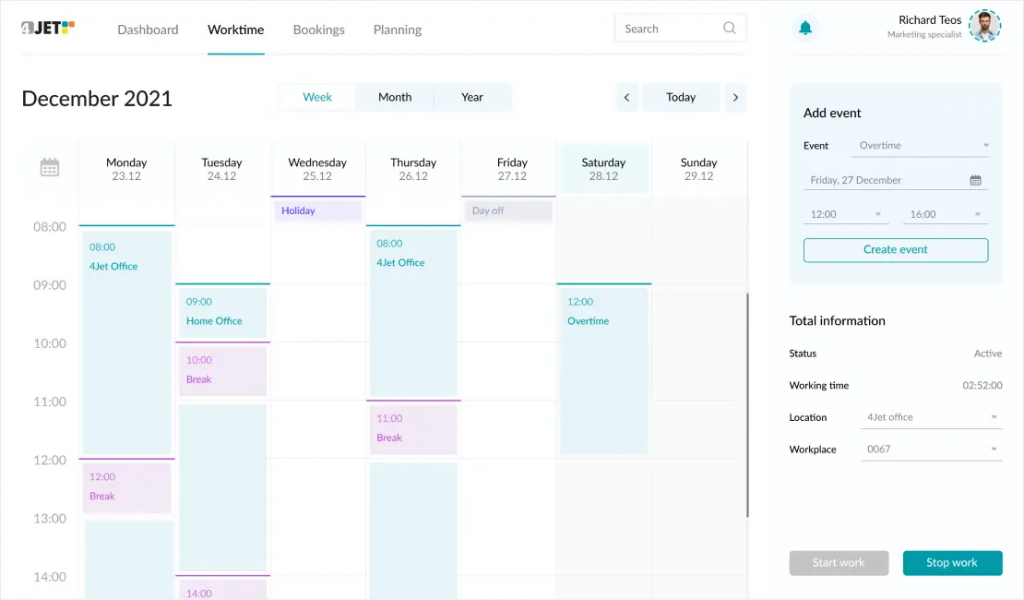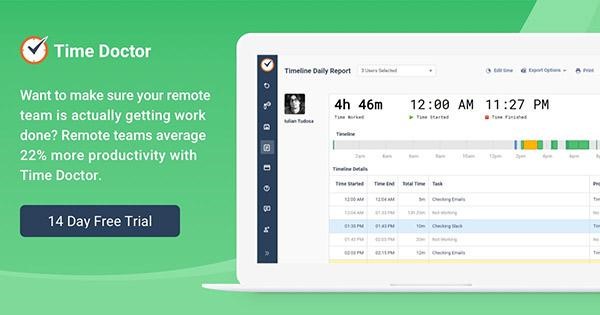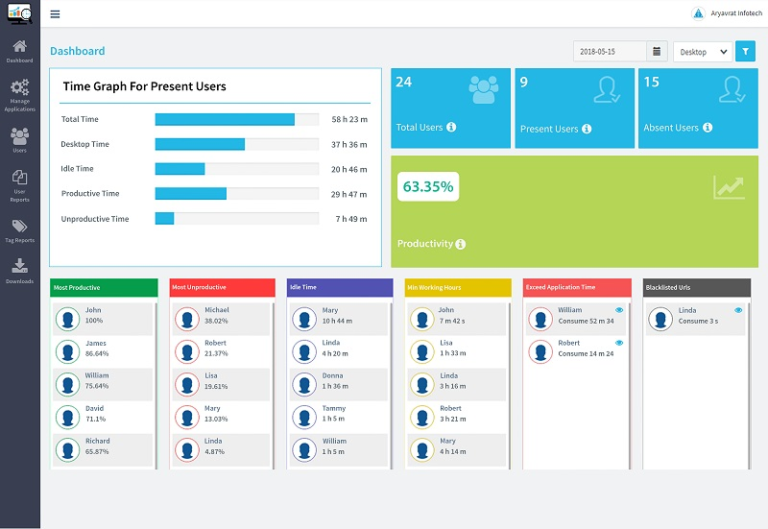Recently, the CEO of an American IT company has faced a problem. The technical support department that served the US market was not handling the workload well. Their colleagues from the European department managed to get the job done faster, although the ratio of incoming calls to the number of employees was the same. The head of the IT company decided to implement a time tracking system to sort out this situation and find out what was wrong. Thanks to this efficient application, the manager found fraudsters in the American department and reasonably distributed the workload without hiring new employees. As a result, the productivity of specialists increased by 15% in the first half a month of working with the monitoring system. Let’s take a closer look at the reasons why businesses should use time tracking tools.
Reason 1. Tracking employee productivity
Financesonline research has found that the average employee spends about 143 minutes on work tasks per day. This is a bit more than 2 hours. The rest of the time, people read the news, check social media, chat with their colleagues, and do other things that are not related to their professional activities.
As a rule, managers pay employees for the number of hours worked per month. But it is extremely difficult to check whether each employee carries out the required number of tasks per day. A business does not want to lose money if a specialist is not working efficiently. Therefore, it is fair that managers want to know what the salary fund is spent on and whether this or that employee has a conscientious attitude to their work.
Time tracking software provides the necessary data on the workload and productivity of employees. In such an application, specialists record the number of minutes spent on tasks. The system automatically generates a report indicating the total working time.
Depending on the features of a tracker, employers can receive information about:
- time spent purely on work (beginning and end of the working day, number and duration of breaks);
- fulfillment of the monthly norm by automatic compilation of a timesheet;
- performance of employees compared to each other (corporate rating);
- state of affairs on a project (for example, manufacturing software development).
Reason 2. Recording overtime
A time tracking system helps to detect employees who stay at their workplaces till late to complete more tasks. These specialists, in turn, expect their efforts to be appreciated and rewarded. Business owners need to know about diligent employees to avoid the emotional burnout of specialists at work in the future. After all, it has long been scientifically proven that workaholism often leads to emotional exhaustion and depersonalization.
The Toolbox tracking solution allows employers to monitor the work of each employee and identify workaholics. When a specialist presses the “Start work” button, the system warns about the maximum possible duration of the shift. The program also automatically assigns mandatory work breaks under labor laws. If someone neglects breaks, overworks, or does not take a vacation, the system sends alerts.
Thus, the employer sees how efficiently and productively employees use their working time.
Reason 3. Redistributing the workload among employees
In companies, employees often perform tasks instead of others. Additional tasks are not part of their responsibilities but sometimes they carry them out to complete a project.
With a time tracking app, you can find out who is responsible for a certain task and determine who is heavily loaded and who is abusing working time. Thus, you can restore justice by redistributing the load so that one person does not carry out a double amount of work.
Workflow, a time tracking tool, solves this problem. The program collects all information about project work in one place, allowing for the distribution of employees by task. Managers can create a to-do list for everyone with estimated completion times and deadlines. Thus, an employer sees the load of each participant and changes it if they notice gaps or overloads.
Reason 4. Training employees in time management
Scientists found that only 17% of people can rationally manage their time. The rest need to develop the skill of time management. Time tracking software encourages employees to plan working time and complete tasks on time. The fact that someone is controlling their performance makes specialists more responsible, efficient and concentrated on work.
For example, the Time Doctor platform not only helps employers track working hours and workload distribution of remote and office employees. The system keeps track of sites and applications that a specialist visits during working hours. It warns when a user is distracted from work and begins to do things that are not related to their tasks.
The application also helps to identify leaders – the most motivated and industrious employees. An employer can reward top performers thus motivating others to work more efficiently. The platform supports flexible, hybrid, and remote work formats.
Reason 5. Dealing with time theft
Time theft is a situation when an employee accepts payment for working hours during which they were inactive. A specialist spending time playing computer games or lying on a progress report is an example of this. Due to such dishonesty, American employers lose about $400 billion annually. The American Payroll Association estimates that the average employee steals 4 hours a week.
To prevent this from happening and help organizations not to suffer losses, business owners are implementing time tracking systems. For example, DeskTrack provides a manager with detailed information about the time in the office and outside it. The program records the time of login into the system, work breaks, and completion of work in the program.
The system flags distractions so the manager can give each employee recommendations to improve performance. Employee activity is recorded every 5-10 minutes in screenshots that are stored in the cloud. Thus, the manager will be able to eradicate the theft of working time in the organization.
Conclusion
A time tracking system is an important software component for organizations of any size and industry. With more than half of employees opting to work from home since the onset of the pandemic and flexible work schedules gaining popularity, time tracking tools are getting more relevant than ever. Organizations are coming to understand the words of the American educator Stephan R. Covey: “The key is in not spending time but in investing it.” It is important for companies that the money invested in employees pays off in full and contributes to challenges of mvp development.




